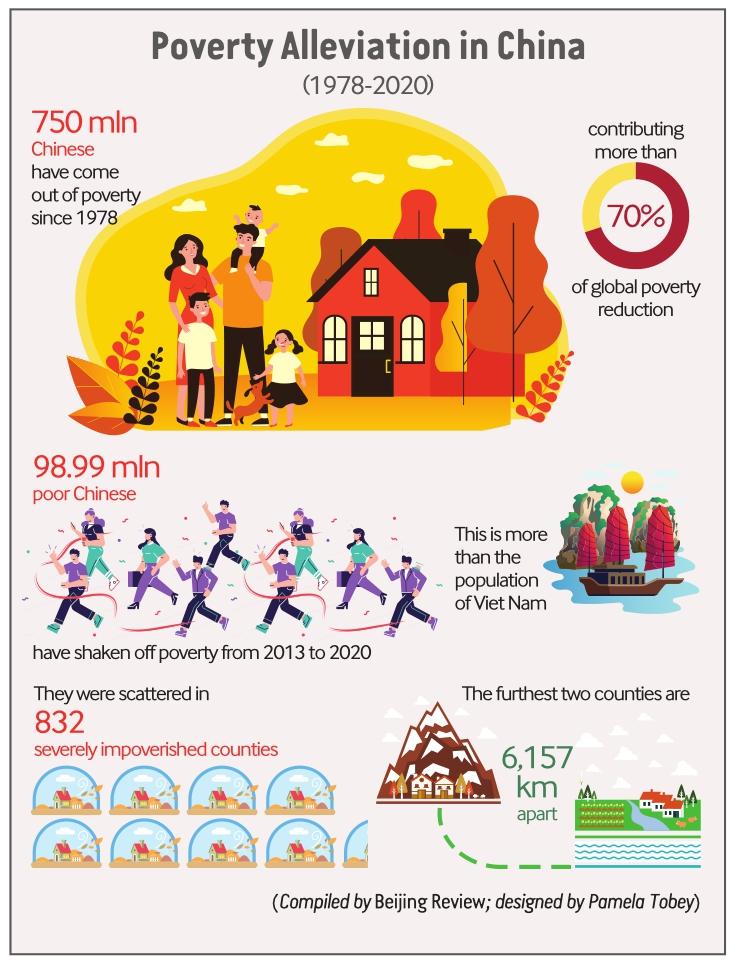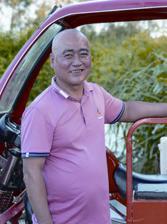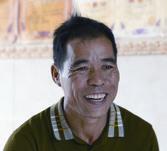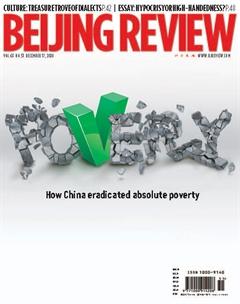SUITING THE REMEDY TO THE CASE
By Li Nan

Wang Haibian and Wang Min, two men living in Maniao, a fishing community in Lingao County, Hainan Province in south China, could serve as an illustration of Russian writer Leo Tolstoys famous line, “Every unhappy family is unhappy in its own way.”
Both fell into poverty for different reasons and emerged out of it in their own respective way.
Wang Haibian is a former drug addict who was the first in the community to kick his habit with de-addiction treatments and poverty with a loan to start a small business. Wang Min, the father of five who struggled to make ends meet, received education subsidies for his children and a job offer for his wife to support his big family.
Like the two Wangs, in the past eight years, nearly 100 million poor Chinese, more than the population of Viet Nam, have shaken off poverty.
This large indigent population lived in 832 severely impoverished counties with different topography and climate. They struggled under the poverty line for different reasons such as illness, lack of education and professional skills, or living in inhospitable areas.
To help them shake off poverty efficiently, tailored relief measures were created.
On November 23, it was announced that the last nine poor counties, located in Guizhou Province in the southwest, had risen above the poverty line. Absolute poverty under the current standard has been eradicated in China.
Targeted solutions
Wang Haibian got hooked on drugs in the mid-1990s. He was in his 20s then, working as a tractor driver traveling to different places. On his trips he met various people, including addicts who introduced him to the habit. Wang said he became a “ghost” who quit his job and resorted to stealing and extortion to buy drugs.
His father was a teacher whose former student Wang Shiyong was a prestigious businessman and deputy secretary of the Communist Party of China (CPC) Maniao Community Branch. The old man, before he died, asked his student to bring his son “back on track.” Wang Shiyong took on the task though many locals were afraid of addicts and didnt want to get close to them.
Eventually, Wang Haibian underwent three de-addiction treatments and in 2006, tried to stand on his own feet again. He was 33 at that time. But it was difficult for a former drug abuser to find a job or even stay on the wagon since in a small community he could hardly avoid running into his old addict friends.
So Wang Shiyong persuaded him to find a job in Guangdong Province, 700 km away from Maniao, to stay away from those “bad friends.”
At the beginning, Wang Haibian was reluctant but his mothers tears finally convinced him. “My mother was badly hurt by my addiction. I was also sick of being a ghost. I wanted to be a man again,” he said.
He became a migrant worker, going back to Maniao nearly two years later. Wang Shiyong came to visit him. “Most people turn a cold shoulder to former drug users or look down upon us. He is the one who really cares about me. He would ask what I want to do and promised to give me a leg-up if I ran a startup,” Wang Haibian said.
With the help of his mother and Wang Shiyong, Wang Haibian bought a secondhand rice-husking machine and started a tiny mill. He also got married and had two children. It seemed his life was back on track finally.
However, years of drug abuse took its toll on his health. His legs became swollen, making movement difficult. His wife Fu Saier became the only breadwinner in the family of four.
To make things worse, both his old house and the husking machine began to collapse and the family was plunged into poverty. “We lived from hand to mouth during that time, without a penny saved,” Wang Haibian told Beijing Review.
In July 2018, the local government conducted a door-to-door household survey and Wang Haibians family was registered as a poor household. As a result, he got an interest-free loan from the local bank and bought a new husking machine. The mill became profitable again.
Wang Haibian grew ambitious. As a mill owner, he had a lot of rice bran, which is a good fowl fodder. He wanted to start a small farm, breeding ducks, chicken and geese. He shared his idea with Wang Shiyong, who was happy to hear about his plan and helped him get some rent-free land with the support of the local government. Wang Haibian set up his farm by the seaside in 2018.
“A startup was the best way for him to shake off poverty,” Wang Shiyong told Beijing Review.

Today, the farm has more than 600 ducks, chicken and geese. During the peak of the novel coronavirus disease epidemic, the poultry couldnt reach the market. Then Wang Shiyong and local officials helped him to access e-commerce platforms and local fairs, promoted his products on their social media accounts and recommended them to friends and relatives as well. The generous help enabled Wang Haibians farm to survive the epidemic.
Unlike Wang Haibian, Wang Min enjoyed good health but had a large family of seven. Before 2017, all his five children were students. “It was a huge burden to raise so many kids,” Wang Min told Beijing Review.
In July 2016, his family was registered as a poor household. His wife was given a job as a cleaner in the community and an annual subsidy of 15,700 yuan ($2,405) allocated for the education of the children.
In addition to the assistance, Wang Min and Wang Haibian have received other help. The local government allocated 60,000 yuan($9,000) to build a new house for each of the two families and bought medical insurance for them and endowment insurance for the two couples.
Also, the two families were given money from the local poverty alleviation fund, which they used to buy shares in a fruit company. In 2019, every family member got a yearend bonus between 600 yuan ($92) and 900 yuan ($138).
Multiple poverty relief measures have benefited the two families. Last year, the per-capita income for Wang Haibians family amounted to 14,873 yuan ($2,279), while that for Wang Mins family was 14,971 yuan($2,294), much higher than the national poverty line of 4,000 yuan ($608).
Empowerment of the poor
Since 1978, 750 million people in China have come out of poverty. According to the World Bank, China has contributed more than 70 percent of global poverty reduction.
Problems, however, remained in the poverty relief campaign. Some practices were likened to “flood irrigation,” meaning using a similar approach, mostly giving money or materials to those struggling under the poverty line. In November 2013, President Xi Jinping proposed targeted poverty alleviation, which was compared to “drip irrigation,”that is, taking measures tailored to individuals circumstances and local conditions so as to avoid resource waste.
Wang Haibian, who was ill and had no funds for a startup, received an interest-free loan and rent-free land as well as medical insurance. Wang Min, who worried about his childrens schooling expenses, was allotted education subsidies for his children and his wife was given a job to increase their income.
Rather than giving the poor fish to feed them for a day, the government has taught them how to fish so that they have a livelihood for life.


